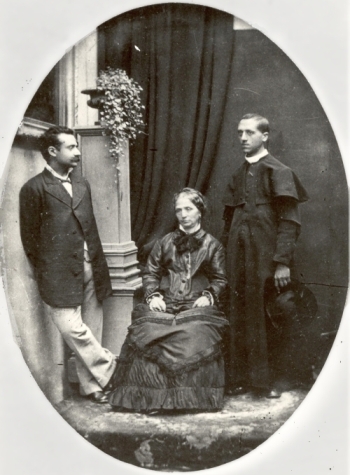Difference between revisions of "Edgardo Mortara and Adoption"
m (Admin moved page Edgardo Mortara to Edgardo Mortara and Adoption) |
m (→References) |
||
| Line 15: | Line 15: | ||
Encyclopaedia Judaica, edited by Cecil Roth. (Jerusalem: Keter Publishing House, 1971) | Encyclopaedia Judaica, edited by Cecil Roth. (Jerusalem: Keter Publishing House, 1971) | ||
Campbell, Duncan. "Jewish Anger at Beatification," The [[Guardian]] [London], 24 June 2000, p. 17. | Campbell, Duncan. "Jewish Anger at Beatification," The [[Guardian]] [London], 24 June 2000, p. 17. | ||
| − | van den Berghe, Gie. "Het Einde van een Tijdperk." Available at: | + | van den Berghe, Gie. "Het Einde van een Tijdperk." Available at: users.skynet.be/streven/artikels/vandenberge.htm |
[[Category: Adoption Celebrities]] | [[Category: Adoption Celebrities]] | ||
Latest revision as of 05:03, 27 February 2018
Biography
Mortara was the son of a Jewish family in Bologna, Italy. When he was five (or a baby, sources differ) he became very ill and his illiterate nurse, a Catholic, baptized him secretly. He recovered, but according to the Papal authorities, who learned of the baptism, he was now officially a Catholic and could not be allowed to be raised in a Jewish family.
In June 1858, when he was six or seven years old Papal gendarmes forcibly removed him from his birth family and he was then brought up by Christians in a monastery (one source says Pope Pius IX himself came to consider him his father).
Such kidnappings of secretly baptized Jewish children had many precedents in Italy, but this became the most notorious. The case aroused international outrage and controversy among Jews, liberal Christians and many Catholics, but their interventions had no effect. Edgardo's name was changed to Pio and he became a Catholic priest. After 1870 and the dissolution of the Papal States (and the Mortara Case was a major factor in this) he was given the chance to return to his origins but he refused. He became an ardent conversionist (specializing in the conversion of Jews) and was a fluent preacher in six languages. His work earned him the title of "apostolic missionary" from Pope Leo XIII and he became a professor of theology in Rome. He died in an abbey in Belgium shortly before the Nazis began to deport Belgian Jews to the concentration camps.
The case is similar to that of Robert and Gérald Finaly, French Jewish war orphans following their parents' extermination in a Nazi concentration camp, who were forcibly baptized in the 1940s after being rescued by gentiles, and hidden in Spain. They were finally tracked down by an aunt, who gained custody of them and took them to Israel. Ten people, including a Catholic priest, were arrested. Sarah Zvi is another example of a [possible] forcible conversion by Christians.
References
Kertzer, David I. The Kidnapping of Edgardo Mortara. (New York: Alfred Knopf, 1997) New Standard Jewish Encyclopedia, editor-in-chief Geoffrey Wigoder. 7th edition. (New York: Facts On File, 1992) Encyclopaedia Judaica, edited by Cecil Roth. (Jerusalem: Keter Publishing House, 1971) Campbell, Duncan. "Jewish Anger at Beatification," The Guardian [London], 24 June 2000, p. 17. van den Berghe, Gie. "Het Einde van een Tijdperk." Available at: users.skynet.be/streven/artikels/vandenberge.htm
- Adoption Celebrities
- Adopted Persons
- European
- Jewish
- Belgium
- Italy
- 19th Century
- 20th Century
- Education, Teaching, Libraries
- Christian
- Ethnic or Religious Identity Confused or Concealed, Racism
- School-age Years, Adolescence
- Child Removed from Home by Social Services
- Government Policy, Assimilation
- Priest, Religious, Teacher, Coach, Mentor, Patron, Apprentice Master or Owner
- Wealthy, Famous, Noble or Divine Adoptive or Foster Families
- Trans-Racial, Trans-Tribal, International or Trans-Cultural Adoption or Fostering
- Institutional Care
